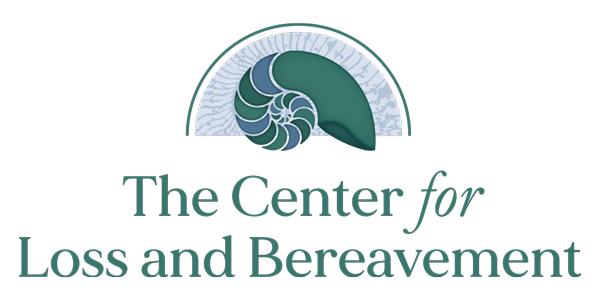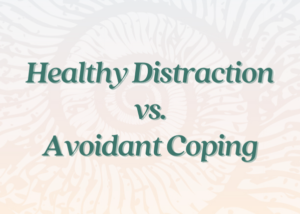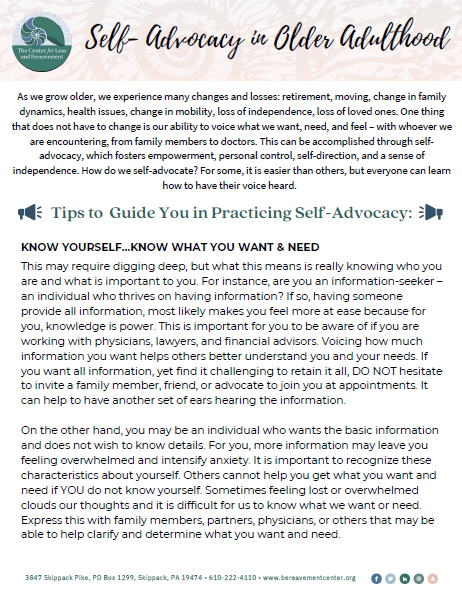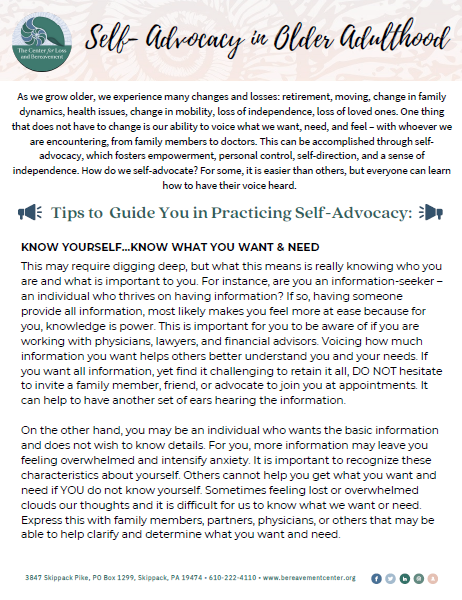CLB Grief Notes
A Grief Note On…
Self-Advocacy in Older Adulthood
As we grow older, we experience many changes and losses: retirement, moving, change in family dynamics, health issues, change in mobility, loss of independence, loss of loved ones. One thing that does not have to change is our ability to voice what we want, need, and feel – with whoever we are encountering, from family members to doctors. This can be accomplished through self advocacy, which fosters empowerment, personal control, self-direction, and a sense of independence. How do we self-advocate? For some, it is easier than others, but everyone can learn how to have their voice heard.
Tips to Guide You in Practicing Self-Advocacy:
KNOW YOURSELF…KNOW WHAT YOU WANT & NEED
This may require digging deep, but what this means is really knowing who you are and what is important to you. For instance, are you an information-seeker –an individual who thrives on having information? If so, having someone provide all information, most likely makes you feel more at ease because for you, knowledge is power. This is important for you to be aware of if you are working with physicians, lawyers, and financial advisors. Voicing how much information you want helps others better understand you and your needs. If you want all information, yet find it challenging to retain it all, DO NOT hesitate to invite a family member, friend, or advocate to join you at appointments. It can help to have another set of ears hearing the information. On the other hand, you may be an individual who wants the basic information and does not wish to know details. For you, more information may leave you feeling overwhelmed and intensify anxiety. It is important to recognize these characteristics about yourself. Others cannot help you get what you want and need if YOU do not know yourself. Sometimes feeling lost or overwhelmed clouds our thoughts and it is difficult for us to know what we want or need. Express this with family members, partners, physicians, or others that may be able to help clarify and determine what you want and need.
COMMUNICATE YOUR NEEDS
Knowing yourself is the first step, but others also need to know what you want and need. It may be helpful to write down your wants and needs before going into a discussion, conversation, or appointment. This can keep you organized and help you highlight key points you want to convey.
ASK QUESTIONS
Do not be afraid to ask questions. Not having your wants and needs met can lead to disappointment and potential resentment. USE YOUR VOICE. You have every right to learn as much about a subject as you feel is necessary and/or to voice your concerns. Your concerns are VALID and asking questions shows you are serious and actively involved in what is happening in your life. If you know you tend to feel intimidated by others when they are explaining or sharing complex information, take time before a discussion or conversation to identify and write down questions you want and need answered. Let the person or people know, up-front, that you have questions that you need answers to. Sharing that you have questions from the start makes it less likely that you leave without addressing those questions.
BE ASSERTIVE…NOT AGGRESSIVE
People are more likely to be truly heard when they are assertive, not aggressive. To advocate for oneself means to SPEAK UP and BE HEARD. This, however, does not mean being loud or antagonistic. Remembering the old saying, “you catch more flies with honey” can be helpful to keep in mind, but do not let others ignore your wants or needs either. Be confident in your words and body language, and it is most likely you will be heard.
BE PERSISTENT
Continue to voice your thoughts and concerns. You may not get exactly what you want/need but sometimes letting others know what matters to you, and why, helps them better understand even if it is different than expected.
BELIEVE IN YOURSELF
You may have experienced many changes which have altered the way you feel about yourself. REMEMBER to BELIEVE IN YOU!! Your thoughts, concerns, and questions matter. YOU matter. DO NOT be afraid to let others know
In addition to the tips previously listed, the Joint Commission uses the following acronym that may be helpful to remember when you are advocating for your health care, however it could be applicable to making financial decisions and advance care planning as well.
Speak Up – ask questions and say what you want and need
Pay Attention – be aware of who is caring for you; know credentials of those offering services
Educate Yourself – to make well-informed decisions, you need information – ask or research
Advocates can help (family, friend, partner) – as a listening ear, health care proxy, or executor
Know about the medications you take; know about your finances
Use a quality health care organization or service (accredited, values safety and quality, knows your condition)
Participate in all decisions about your care or financial situation
Join Our
Mailing List
Donate
Today
Request
Information

Affiliations
• NACG
• CBEM Changemaker
• ADEC
• Charity Navigator
Quick Links
About Us
Individual & Family Grief Counseling
Volunteer
News
Grief Support Resources
Contact
Ph: 610-222-4110
Fax: 610-222-4116
3847 Skippack Pike
P.O. Box 1299
Skippack, PA 19474
Support The Center For
Loss and Bereavement


